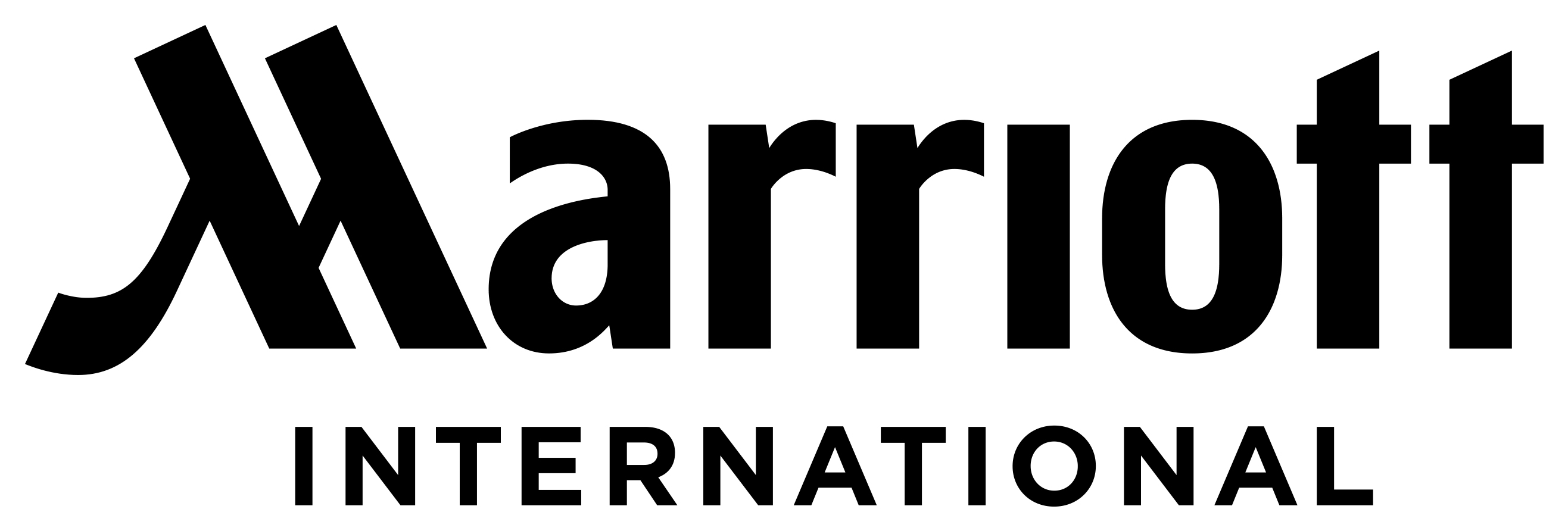- Marriott is hit hard by the effects of Covid-19 as RevPAR declines almost a quarter worldwide in 1Q 2020
- Increased bookings in Europe are a 'beacon of hope' a new streamlined Airbnb
- A 'wrecking ball' had been taken to the hospitality industry but Covid-19 turbulence isn't the biggest threat to hotels
- Data metrics - latest performance insights from STR
- News briefs - bitesize updates of latest industry news and developments
Marriott is hit hard by the effects of Covid-19 as RevPAR declines almost a quarter worldwide in 1Q 2020
Marriott International has reported first quarter 2020 results, which were dramatically impacted by the Covid-19 global pandemic and efforts to contain it, but occupancy and booking trends across much of the world suggest demand has now stabilised, albeit at low levels. The hotel group took a USD344 million hit from the crisis with net income for the quarter totalling just USD31 million, compared to USD375 million in the year-ago quarter. First quarter adjusted net income totalled USD85 million, compared to first quarter 2019 adjusted net income of USD482 million. First quarter 2020 comparable systemwide constant dollar RevPAR declined 22.5% worldwide, 30.4% outside North America and 19.5% in North America, but the worst appears to be over. Arne M Sorenson, president and chief executive officer of Marriott International acknowledges that a resilience of travel demand is evident in improving trends in Greater China where occupancy at the company's hotels reached 25% in Apr-2020, up from less than 10% in mid-February 2020. "Looking at our occupancy and booking trends, it appears that lodging demand in most of the rest of the world has stabilised, albeit at very low levels," he says.

Increased bookings in Europe are a 'beacon of hope' a new streamlined Airbnb
Airbnb still can be a success, as long as it embraces the idea that it may have to be smaller in scale in the short-to-medium term and operate in a more efficient manner, according to leading data and analytics company, GlobalData. "Airbnb may be turning a corner," says Global Data's travel & tourism analyst Ralph Hollister. The platform is terminating the contracts of 1,900 of its 7,500 staff members, as well as scaling back its spending in growth areas such as luxury homes and traditional hotels. "These actions are necessary as the company has no choice but to streamline its business in order to survive," explains Mr Hollister. In addition to the proactive steps the company is taking to ensure a brighter future, there has been a recent surge in bookings in Europe as restrictions are beginning to be relaxed. The accommodation platform recently stated that domestic bookings in Denmark were at about 90% of April 2019 levels, while in the Netherlands it was approaching 80%. Mr Hollister describes the increased bookings in Europe as "a beacon of hope for Airbnb and suggests the company should now be "focusing on maximising domestic bookings" as a combination of a lack of consumer confidence and increased fear regarding where the virus "will push travellers towards domestic trips".

A 'wrecking ball' had been taken to the hospitality industry but Covid-19 turbulence isn't the biggest threat to hotels
Three leading hospitality industry technologists gave crisis recovery advice to hospitality industry leaders in the recent fourth 'I Meet Hotel' industry webinar last week, organised by Bidroom. The experts, Kris Glabinski, chief business development officer at Lybra; Ryan Haynes, director and lead consultant at Haynes MarComs; and Ali Beklen, founder and managing partner at HotelRunner; said that the 'old' 2020 is gone. They agreed that hotels need to embrace big data, not be overwhelmed by it, and understanding new requirements of guests in the aftermath of Covid-19 will be key to survival. They said that a "wrecking ball" had been taken to the hospitality industry. However, the biggest threat was not the turbulence of the pandemic, but applying yesterday's logic to in a post-Covid-19 world. They believe that the hospitality landscape is now defined by four new realities, namely: tension between big data and unreliable data, new and unpredictable guest needs, new and costly operational realities and the need to empower staff.

Data metrics - latest performance insights from STR
- Jeddah, Saudi Arabia - the hotel industry reported its lowest overall performance on record in Apr-2020, according to preliminary data from STR. In comparison with Apr-2019, occupancy declined -57.5% to 21.9% (down from 25.0% in Mar-2020); ADR fell -18.6% to SAR544.77 and RevPAR shrunk -65.4% to SAR119.33. The occupancy and RevPAR levels were the lowest for any month in STR's Jeddah database, while the ADR value was the lowest for an April in the market since 2008.
- London, England - Apr-2020 was the city's worst hotel performance month on record, according to preliminary data from STR. In comparison with Apr-2019, occupancy fell -73.0% to 21.9% (down from 32.7% in Mar-2020), ADR declined -38.9% to GBP87.18 and RevPAR reduced -83.5% to GBP19.11. This represents the first time ADR fell below GBP90 since Aug-2005, while occupancy and RevPAR hit their lowest level for any month in STR's London database.
- Melbourne, Australia - the hotel industry reported its worst hotel performance month on record in Apr-2020, according to preliminary data from STR. In comparison with Apr-2019, occupancy fell -62.8% to 28.8% (down from 47.8% in Mar-2020), ADR declined -32.8% to AUD115.22 and RevPAR shrunk -75.0% to AUD33.16.
- United States of America - The states of Florida and Texas led gains in hotel occupancy for the week ending 02-May-2020, the first 'real weekend' with eased Covid-19 restrictions as the industry "showed an obvious jump in hotel demand," according to Jan Freitag, STR's senior VP of lodging insights. Its analysis shows that 13 of its submarkets showed greater than 10-point weekend vs. weekday occupancy gains led by Galveston and Texas City (30.9 point difference), Mobile (27.7 point difference), Daytona Beach (24.1 point difference), Corpus Christi (23.6 point difference) and Panama City (20.1 point difference).
News briefs
- Choice Hotels International says domestic US systemwide RevPAR declined -15% in 1Q 2020 compared to the same period of the prior year. Net income was USD55.5 million for the three month period, representing diluted earnings per share (EPS) of USD0.99.
- Fuel, a provider of guest-facing hotel software solutions and digital marketing services for the global hospitality industry, has expanded the digital-key functionality of its industry-leading mobile application for independent and boutique hotels. Enabled through a successful integration with ASSA ABLOY, the newly incorporated technology allows hotel properties with the Fuel Contactless Mobile App and ASSA ABLOY locking systems to let guests access their assigned guestrooms using their mobile phone as a digital key.
- Georgia's Government announced the country will be ready to receive foreign tourists from 01-Jun-2020 and will commence the provision of domestic tourism services from 15-Jun-2020. Prime Minister Giorgi Gakharia said: "Georgia will be one of the first countries that will open its borders and infrastructure to receive guests from abroad". Georgia plans to establish "safe corridors" with neighbouring countries and countries with tourism potential.
- ITC Hotels has launched its 'WeAssure' initiative to ensure stringent clinical levels of hygiene and safety at its properties across India. The programme has been designed in collaboration with medical professionals and disinfection experts to further enhance the existing hygiene & cleaning protocols and has been accredited by National Accreditation Board for Hospitals & Healthcare Providers (NABH).
- Karisma Hotels & Resorts has revealed its Holidays for Your Heroes initiative donating 150 luxury all-inclusive resort stays to essential workers and their families through its Karisma Foundation and partners. The company has opened a public call to nominate everyday heroes who are deserving of a five-day, five-star dream vacation at an all-inclusive resort of choice in Latin America or the Caribbean.
- Hotel industry solutions partner Otrum has launched a virtual remote control for hotel television usage. The control is managed by a guest's smart device which scan a unique QR code to launch a web based remote control on their phone or tablet and reduce their exposure to potentially contaminated surface areas and potentially encourage use of in-room interactive services.
- Peru's Government has allocated USD32 million for the country's tourism sector, assisting over 16,000 companies. Hotels and restaurants received USD12 million, while 24,500 guides and artisans received USD5.5 million in total.
- Pursuit has announced its new safety promise to elevate cleanliness standards, heighten physical distancing measures and increase staff training protocols across its collection of attraction and hospitality experiences. Designed to ensure both guest and staff peace of mind when travel is able to safely resume, the programme builds upon the brand's current rigorous cleaning and training protocols that were elevated in the midst of the global health pandemic.
- Xenia Hotels & Resorts reported 1Q 2020 RevPAR fell by more than a quarter year-on-year, down -28.5% to USD121.68. Same-Property RevPAR was USD126.52, a decrease of -27.6% compared to the first quarter of 2019, as a result of a nearly 20 point decline in occupancy percentage and a 3.3% decrease in ADR.